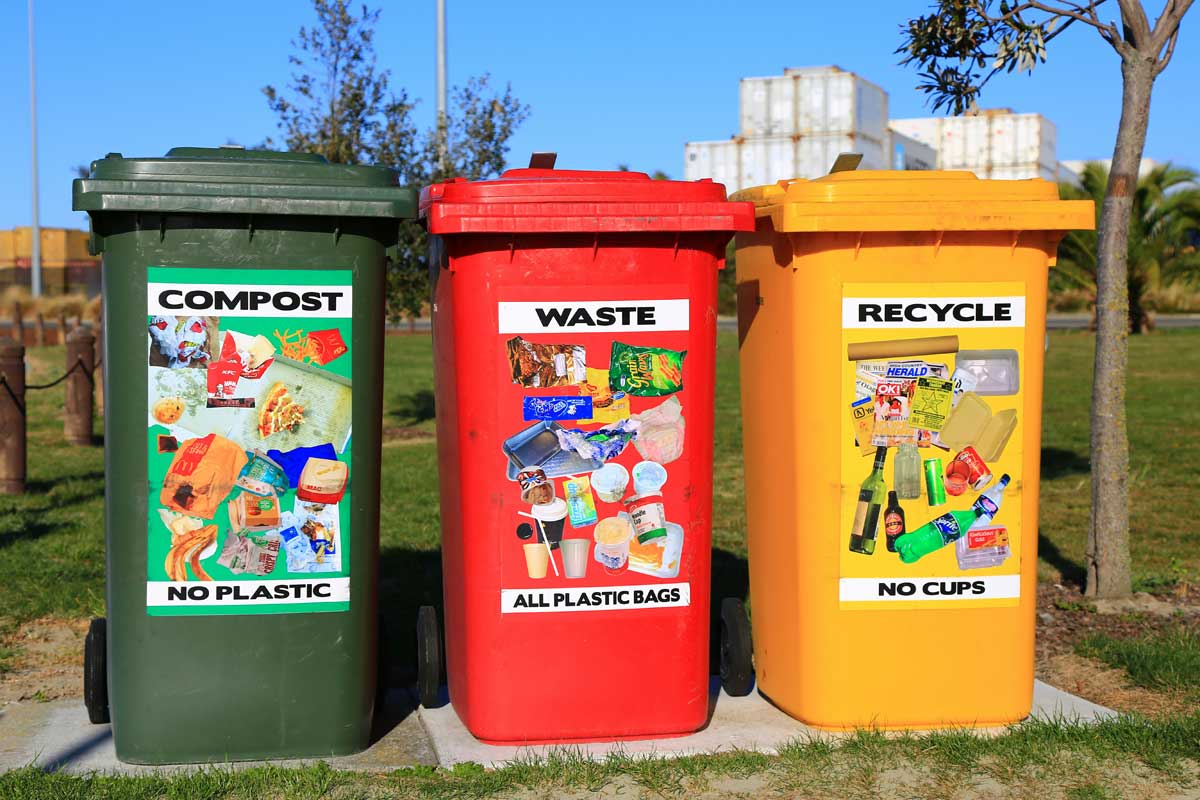Why Is Recycling So Important?

There are plenty of facts out there about why recycling is important. The world population is growing, not shrinking, and each human being adds significant waste to the planet over his or her lifetime. In New York alone, people produce enough trash in one day to fill the entire Empire State Building.
The frustrating thing is that it’s not that difficult in most developed countries to make a difference. And what a difference we can make. If everyone repurposed their copy of a single edition of The New York Times, we could save 75,000 trees.
What Exactly Is Recycling?
We use various products in our households and workplaces daily to fulfill our basic needs. Most of these products and their packaging are wasted and dumped in bins, ending up in landfill sites. Consumers place recyclable materials in a designated disposal container at their local waste facility. Then, the material is taken to a recycling facility and/or transported to a location where it can be reused for a new purpose. A recyclable product is turned back into a raw form that can be used to create a new and different product.
Not only are natural resources limited, but recycling efforts can significantly reduce additional waste that will not only harm the planet today but future generations as well. The natural resources on our planet Earth are limited, so we must make the most of them to conserve, recycle, and reuse whenever possible.
Recycling things involves using a product, in part or as a whole, in the production of similar or the same products again. In regular production, raw materials are sourced directly from natural resources. For example, fresh pulp from cut-down trees creates first-generation paper. Recycled paper can be used to produce new paper without vastly compromising the quality of the final product. The same applies to most other materials like metal, glass, and plastics.
What Can I Recycle?
What you can recycle depends on your area; not all materials may be recyclable. Check with your local recycling center to find out what you can and cannot recycle. You’ll notice that recyclable products are labeled with numbers 1 to 7, 1 being the most and 7 being the least recyclable. Learn more about what recycling codes mean.
Also, check with your city to make sure that you have the correct disposal containers available. This will ensure that your efforts are being put to good use and that your waste is heading to the recycling center rather than the landfill you are working so hard to avoid!
Ways To Reduce Trash You Create
In our general consumption of goods, we ignore the fact that a significant portion of our waste can be reduced or reused before recycling. It would be very responsible of us to reduce our product consumption to the maximum extent possible. So, the three R’s of sustainability are Reduce, Reuse, and Recycle.
It’s easier than you think to reduce waste by simply cutting down on the amount of non-recyclable materials you throw out. Here are some tips.
7 Easy-To-Follow Tips To Reduce Waste
- When purchasing groceries, bring your own reusable tote bags. If you forget, insist on paper and pack as many goods in one bag as possible without double-bagging.
- Try to reduce the amount of packaging you purchase by buying products in bulk.
- Switch from mail to paperless statements (bills, financial statements, newsletters, etc.) and have them e-mailed to you instead.
- Buy products that are packaged in cardboard or paper board instead of Styrofoam.
- Avoid disposable items such as paper plates, cups, and utensils.
- When wrapping presents, opt for reusable gift bags instead of wrapping paper—or even reuse wrapping paper.
- Avoid using plastic wrap and opt for beeswax wraps as an eco-friendly alternative.
Donate Your Clothing & Home Goods To Charity
- Your city most likely has many charity shops (like Goodwill and the Salvation Army) that will take your gently used clothes, electronics, furniture, and other household items to resell as income for these non-profit organizations. You can even donate your car. These donations help others and are typically a tax deduction for you, too.
- Shop and sell your clothing at an online thrift store. You can send in your items to sell yourself or have them take care of the sale for a higher fee. Your trash may just be someone else’s treasure!
- Composting is the simple step of setting aside your fruit peel pits and other select food waste and putting it into a compost pile. This will reduce trash, create a much cleaner-smelling kitchen, and produce great nutrients for your garden. We review and pick the best composting bins.

Photo by Nareeta Margin, licensed via Unsplash
Why Recycling Is Important
There are many good reasons for adding recycling to your routine, ranging from a personal level to a global advantage.
Recycling your waste makes you more conscious in how you use and dispose of goods. Studies show that people who recycle instinctively cut back on buying unnecessary things. They think of how to dispose of the packaging or the product after use before even buying it. As a result, people save a considerable amount of money while also saving the planet.
Individuals, governing bodies and companies can take pride in minimizing their waste as they are helping to reduce global environmental damage and making this earth a better place to live. It is a direct contribution that everyone can make.
Apart from the environmental and emotional benefits, employment generates an economic impact. When you put your waste in different bins for paper, plastics, glass, and so on, the contents of each are further segregated and taken to recycling plants. The manpower involved in the logistics and processing of your waste is considerable; thus, you are helping to provide jobs and aid the welfare of their families. Some will argue that the manpower and steps to recycle are more expensive than trash, but multiple organizations insist that the benefits significantly outweigh the additional resources and costs.
We must also be aware of the emissions that result from incineration. Sometimes, the heat generated is used to generate electrical power (waste-to-energy plants) to offset the damage and minimize the carbon footprint. Even though this sounds positive, there are concerns about the type of waste being incinerated and whether it has any toxic effects on the surrounding areas.
Recycling’s Global Impact
What happens to your recycled items after they leave the recycling bin? Plastics, in particular, can be expensive to process, and some products are not recyclable due to being contaminated with food or other materials. In these cases, the goods become an internationally traded commodity that was, until recently, shipped to China for a high price tag.
In 2018, China announced a ban on the import of plastic waste as an initiative to clean up its environment. This left other Asian countries, including Malaysia, Thailand, and Vietnam, to become the top importers of plastic scrap. However, the surge in plastic imports in those areas has encouraged unethical practices, and the local government is cracking down and shutting down those facilities. As a result, the scrap is left to sit in abandoned facilities or stranded at seaports with no destination.
Purchase Products Made From Recycled Materials

You’re no doubt aware by now why this is so important. However, the effort involves recycling existing products and purchasing products that have already been recycled. Today, thanks to a recent strong push in the green movement, you’ll notice more and more products made from recycled materials.
To purchase products made from reused materials, look for a recycling symbol and language on the product’s packaging. Every day, manufacturers are finding new ways to create recyclable items, including paper towels, cardboard boxes, plastic containers, crayons, ink cartridges, paint, garden supplies such as hoses, furniture, wallpaper, and even garbage cans.
Don’t forget the packaging. It is often too big for the product inside and uses non-recycled materials. This is wasteful and should be minimized as well when making a purchase decision. Voting with your wallet is one of the best ways to make an impact while sending a clear message to the companies that make these products about your desire for more attention to recycle-friendly products.
Recycling Facts
Studies have shown that:
- More than 60% of the rubbish that ends up in trash bins can be recycled.1
- Around 16% of the cost of a product is spent on its packaging, which is completely wasted if not disposed of properly.2
- 80% of a vehicle can be recycled.2
- Aluminum cans can be recycled entirely and put to use in a short time.
- Glass can be recycled 100% and reused.3
- 24 trees are cut down to make one ton of paper.4
- On the contrary, recycled paper is proven to create 70% less pollution compared to non-recycled material paper production.7
- Plastics, which can often be recycled, take around 500 years to decompose.5
- One recycled tin can save enough energy to power a television for 2 hours.6
- 70% less energy is utilized to recycle paper compared to making it from raw materials.7
- Similarly, recycling one glass bottle can save enough energy to power a personal computer for 25 minutes.7
Reduce E-Waste Through Electronics Recycling

Due to rapid technological change, obsolescent items have created a fast-growing mass of electronic waste around the globe. E-waste (or waste from electronics) is toxic if disposed of improperly. The chemicals, metals, and associated solders, glues, and plastics can cause both environmental and health problems.
For this reason, the WEEE (Waste Electrical and Electronic Equipment) Directive in the European Union makes businesses, manufacturers, and retailers of electrical and electronic equipment responsible for ensuring their goods do not end up in landfills or incineration. Some new regulations involve dismantling parts into metals and plastics and individually processing them.
So, any working TVs, monitors, computers, cell phones, batteries, and other consumer electronics can be sold or donated, prolonging their useful life. Find out how you can turn your old electronics into cash by recycling them. And if they are no longer working, the same companies who will give you money for them should be able to accept them and ensure they are disposed of properly.
We Only Get One Planet
Hopefully, this article has helped you realize the importance of your efforts—not just for us but also for our kids, grandchildren, and anyone who follows in our footsteps. Take care of your planet, and it will take care of you. Recycling is an important step when looking for ways to reduce environmental pollution and energy consumption. A sustainable lifestyle is sometimes needed, and we can adopt such beneficial changes in our daily lives very well.
If you’d like to learn more about this topic, we have plenty of articles about recycling, including freecycling programs and ways to reduce your use of plastic bags.
What are you doing to help reduce your carbon footprint? Let me know in the comments!
Sources: [1] Indiana University. “Waste & Recycling Study.” [2] Consumer Reports, [3] GPI.org, [4] WorldAtlas.com, [5] Environment about.com, [6] Environmental Protection Agency, [7] RecyclingBins.co.uk



